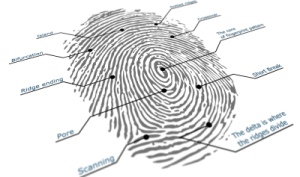
Digital security firm Kaspersky Lab has shown off a new ring with a fake fingerprint that is meant to protect the wearer’s biometric data.
With the increased reliance on the use of biometric data for user authentication has come an increased concern about that biometric data being stolen or compromised.
The ring, made of “thousands of conductive fibers” printed on a rubber stone housed in a silver casing, gives wearers a secure alternative to using their own fingerprint for biometric authentication. While it’s currently just a Proof of Concept, in theory each ring produced would be unique and the fingerprint printed on it would never have been stored anywhere in order to prevent leaks.
If an individual’s biometric data does end up being compromised — as was the case in August of this year when South Korean security firm Suprema was found to have hosted customers’ biometric data in an open online database — users cannot simply reset or change their fingerprint or face data the way they would a password or PIN.
Kaspersky’s fake fingerprint ring is meant to be a solution to this problem, with users simply having to block the fingerprint and replace it if it goes missing, is stolen, or in the event of a security breach.
“That ring can be used to authenticate the user with biometric systems, such as a phone or a smart home door lock. And if the data of the ring fingerprint leaks, the user can block this particular ring and replace it with a new one—and their own unique biometric data won’t be compromised,” Kaspersky says.
The ring is only a concept prototype by Kaspersky as one possible solution to the threat of biometric data leaks. The company admits that it isn’t without its flaws — it could be lost or stolen requiring the user to lock it remotely and then replace it — and that the real solution to the issue the ring would be meant to address is for increased security within apps themselves to prevent data leaks.
Source: PCMag
–
December 3, 2019 – by Tony Bitzionis






Follow Us